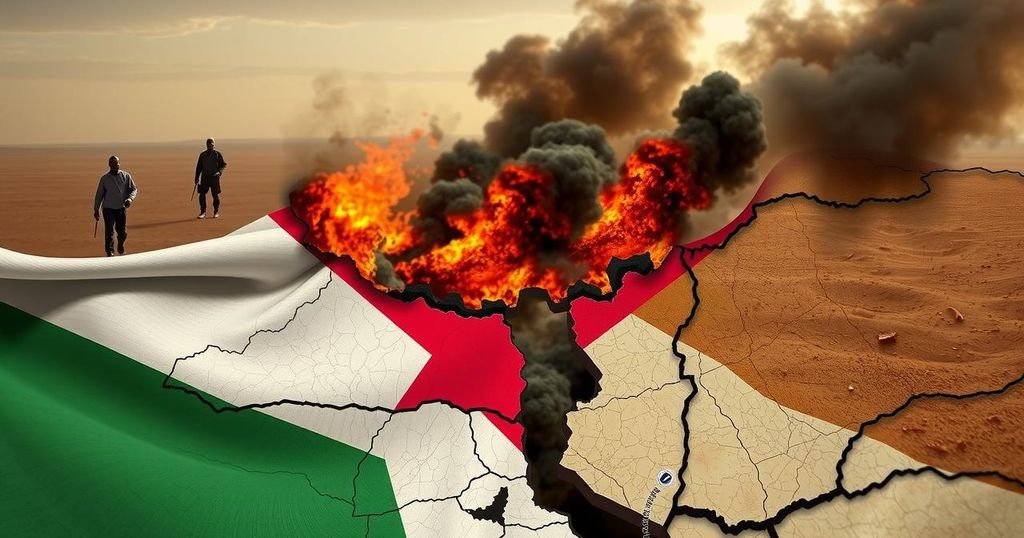Sudan Faces Potential Partition Amid Ongoing Conflict and Humanitarian Crisis

Sudan faces a potential partition that may isolate Darfur from the rest of the country amid ongoing conflicts between the national army and the RSF. Analysts warn that ongoing fighting could exacerbate local conflicts and lead to a complete state collapse. Significant recent victories for the army raise concerns about the RSF’s ability to maintain control in Darfur, where it holds deep-rooted influence.
Sudan is at a perilous juncture, facing the ominous prospect of a de facto partition that could isolate Darfur from the rest of the country due to ongoing conflicts between the national army and the paramilitary Rapid Support Forces (RSF). The RSF, entrenched in Darfur—a region comparable in size to France—continues to solidify its position even as the army makes gains in other areas. Analysts warn that unless an accord is reached, the partition could catalyze localized conflicts and potentially lead to the complete disintegration of the state.
The conflict, which reignited in April 2023 over control of Sudan, has claimed tens of thousands of lives and displaced millions. Kholood Khair, the founder of Confluence Advisory, articulated the dire implications of a split: “A split would be the beginning of the end for Sudan.” She further noted that as fighting subsides, entrenched divisions may undermine the prospect of a peace agreement, leading to irreversible disintegration of the country’s political landscape.
Recently, the Sudanese army reclaimed control over Wad Madani, the nation’s second-largest city, which had previously been under RSF control for over a year. Reports of human rights abuses committed by the RSF during its occupation raise concerns about accountability and justice in the ongoing conflict. Despite this recent military success, analysts suggest that the RSF will retain its foothold in Darfur, where it has strong historical connections, making it challenging for the army to reclaim the region.
The international dimensions of the conflict further complicate the situation. Countries like Iran, Turkiye, and Egypt have increased support for the army as it attempts to regain strength after significant territorial losses. Egypt’s desire for a stable Sudan under army control reflects broader geopolitical interests, with potential acceptance of a divided Sudan if it means a diminished RSF influence.
Nevertheless, local groups such as the Sudan Liberation Movement and the Justice and Equality Movement, who have previously opposed the central government, may continue to resist the RSF’s growing power. With the potential for infighting among allied factions of both the RSF and the army, the risk of a complete state collapse looms larger than ever. “Each [of the army’s militias] will demand to share wealth and power in any post-conflict situation,” highlighted Suliman Baldo, underscoring the potential for chaos stemming from factional rivalries.
As the conflict progresses and control solidifies, the situation in Sudan remains deeply complex and fraught with challenges, requiring urgent international attention to avert further humanitarian disasters, and striving for a sustained peace within a potentially fractured state.
The ongoing conflict in Sudan, primarily between the Sudanese National Army and the Rapid Support Forces (RSF), traces its roots to longstanding political and ethnic tensions, exacerbated by power struggles and previous civil wars. The RSF, formed from former Janjaweed militias during the Darfur conflict, has established itself as a formidable force in the region. Since hostilities intensified in April 2023, Sudan has grappled with a humanitarian crisis characterized by mass displacement, widespread violence, and dire food shortages. The stability of the nation is at stake, as significant segments of the military and paramilitary factions vie for control, thus raising concerns about a potential partition along regional lines.
In summary, Sudan is on the brink of a significant division, with the RSF potentially consolidating control over Darfur amidst ongoing conflicts. The situation is dire, as the continuation of fighting could lead to fragmented allegiances, further disintegration of the state, and exacerbated humanitarian crises. International support and intervention will be crucial in navigating the complexities of this conflict and in seeking a lasting resolution to ensure the stability and integrity of Sudan as a nation.
Original Source: www.aljazeera.com








